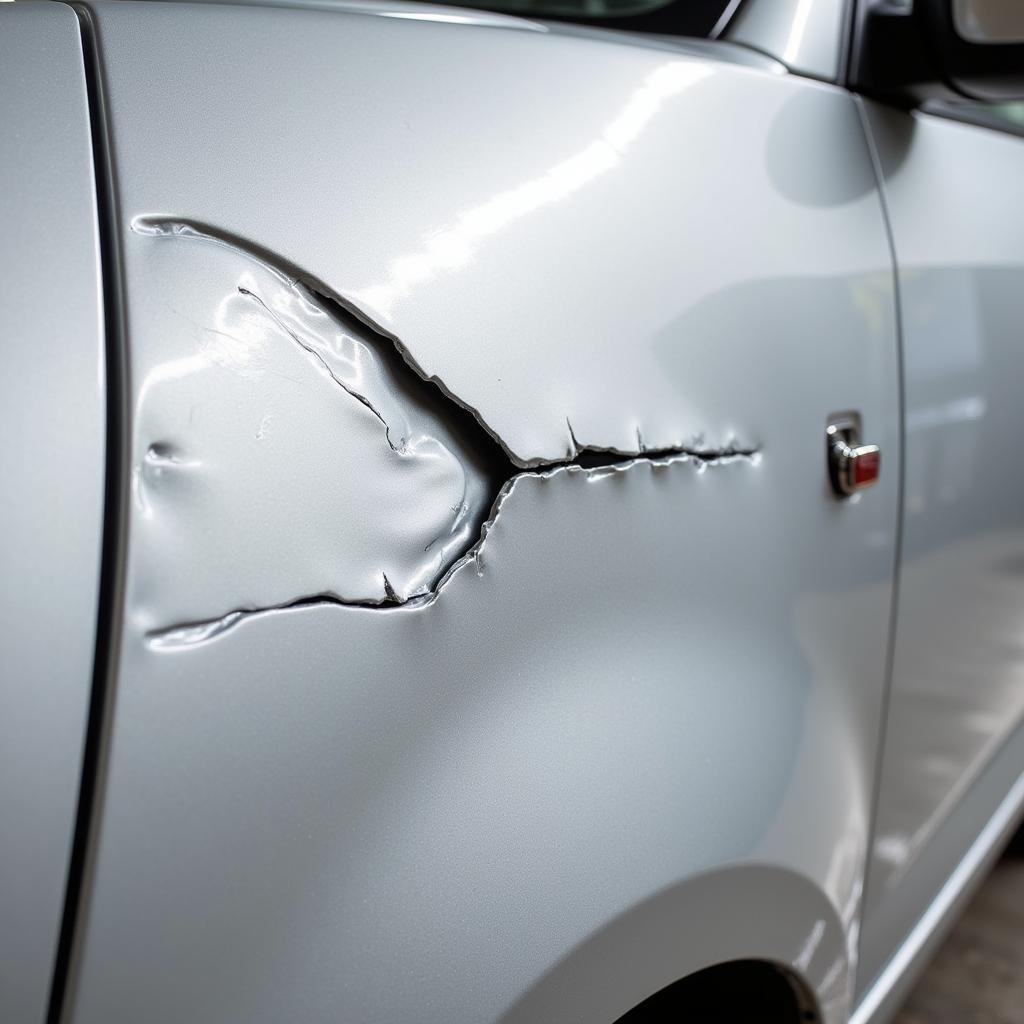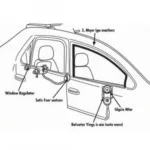Aluminum car body repair in Sudbury requires specialized knowledge and tools. More and more vehicles are utilizing aluminum in their construction due to its lightweight and fuel-efficient properties. This shift presents unique challenges for collision repair, demanding a different approach than traditional steel body work. Choosing the right repair shop with the necessary expertise is crucial for ensuring the structural integrity and safety of your vehicle.
Understanding the Nuances of Aluminum Car Body Repair
Aluminum isn’t just a lighter version of steel; it behaves differently in accidents and requires specialized repair techniques. Its lower melting point and susceptibility to galvanic corrosion mean that repairs must be carried out with precision and the correct equipment. Attempting DIY repairs or entrusting your aluminum vehicle to a shop without the proper training and tools can lead to further damage and compromise the vehicle’s safety.
Why Choose a Specialist for Aluminum Car Body Repair in Sudbury?
Repairing aluminum car bodies isn’t the same as repairing steel. Here’s why you need a specialist in Sudbury:
- Specialized Tools: Aluminum repair requires dedicated tools, including specialized welders and dent pullers, designed to work with aluminum’s unique properties.
- Corrosion Prevention: Aluminum is highly susceptible to galvanic corrosion when in contact with other metals. Technicians trained in aluminum repair understand how to prevent this.
- Specific Welding Techniques: Welding aluminum differs significantly from welding steel. Specialists are trained in techniques like MIG welding and have the equipment necessary to execute these welds correctly.
- Structural Integrity: Incorrectly repaired aluminum can compromise the vehicle’s structural integrity, impacting its safety in future collisions.
Finding the Right Aluminum Car Body Repair Shop in Sudbury
Choosing the right shop can be daunting. Here are some factors to consider:
- Certifications and Training: Look for certifications from recognized organizations like I-CAR (Inter-Industry Conference on Auto Collision Repair). This demonstrates a commitment to training and staying updated on the latest aluminum repair techniques.
- Equipment: Ensure the shop has the necessary specialized equipment for aluminum repair, such as MIG welders and dedicated aluminum dent pulling systems.
- Experience: Ask about their experience with aluminum repairs. A shop with a proven track record of successful aluminum repairs is more likely to provide quality service.
- Reviews and Testimonials: Check online reviews and testimonials from previous customers to get an idea of their reputation and customer service.
What to Expect During the Repair Process
Understanding the repair process can help you feel more confident in your choice of repair shop:
- Damage Assessment: A thorough assessment of the damage is crucial to determine the best repair strategy.
- Repair Planning: A detailed repair plan will be developed, outlining the necessary steps and estimated costs.
- Aluminum Repair: The actual repair process may involve techniques like dent removal, panel replacement, or welding.
- Finishing: After the repair, the area will be finished to match the original paint color and texture.
- Quality Control: A final inspection ensures the repair meets quality and safety standards.
Common Aluminum Car Body Damage and Repair Methods
Different types of damage require different repair approaches. Here are some common scenarios:
- Minor Dents and Scratches: Paintless dent repair (PDR) is often effective for minor dents, avoiding the need for fillers or repainting.
- Larger Dents and Creases: Specialized aluminum dent pulling systems can be used to restore the panel’s shape without requiring replacement.
- Tears and Punctures: Depending on the severity, these may require welding or panel replacement.
- Corrosion: Addressing corrosion promptly is vital to prevent further damage. This may involve removing the corroded area and applying protective coatings.
“Aluminum is a fantastic material for car bodies, but it demands respect in the repair process. Cutting corners can lead to costly and dangerous consequences down the road,” says John Miller, Lead Technician at Sudbury Auto Body Specialists.
 Damaged aluminum car body panel in Sudbury requiring repair
Damaged aluminum car body panel in Sudbury requiring repair
Conclusion
Aluminum car body repair in Sudbury requires specialized expertise and equipment. Choosing a qualified repair shop ensures the safety and longevity of your vehicle. By understanding the nuances of aluminum repair and asking the right questions, you can make an informed decision and get your vehicle back on the road safely.
FAQs
- Is aluminum car body repair more expensive than steel? Generally, yes, due to the specialized equipment and training required.
- Can I repair aluminum car body damage myself? It’s not recommended unless you have the proper training and equipment.
- How long does aluminum car body repair take? The timeframe depends on the extent of the damage.
- How can I prevent corrosion on my aluminum car body? Regular washing and waxing can help protect the surface.
- What type of welding is used for aluminum car body repair? MIG welding is the most common method.
- How do I find a certified aluminum car body repair shop in Sudbury? Look for certifications from organizations like I-CAR.
- What should I look for when choosing an aluminum car body repair shop? Experience, equipment, and certifications are key factors.
“Remember, your safety is paramount. Investing in a qualified repair shop for your aluminum vehicle is an investment in your peace of mind,” adds Susan Davis, Automotive Engineer at Advanced Auto Solutions.
For assistance, contact WhatsApp: +1(641)206-8880, Email: [email protected]. We have a 24/7 customer support team.

